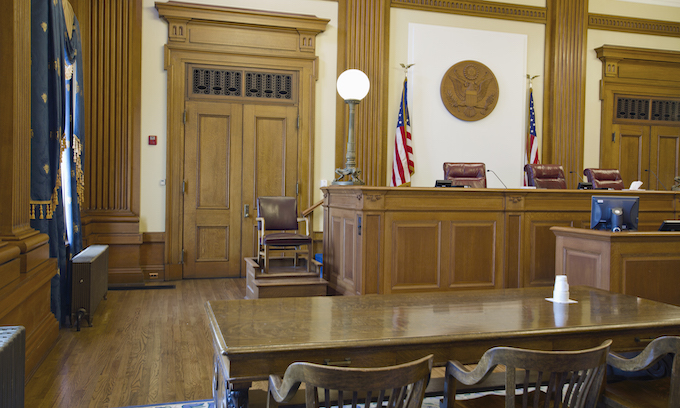A federal appeals court has handed the Justice Department a victory in its litigation with Donald Trump, allowing federal prosecutors to resume reviewing documents bearing classified markings that were among the thousands seized from the former president’s Mar-a-Lago residence last month.
The three-judge panel sided with the federal prosecutors Wednesday in response to their request from late last week to partially stay a ruling that enjoined them from further review of the seized material as part of its criminal investigation.
The Justice Department has been investigating the former president on criminal suspicion of illegally collecting and retaining national defense and classified records, which resulted in the FBI executing a search warrant on Trump’s Palm Beach, Fla., residence on Aug. 8. Some 11,000 documents were produced by the search, including more than 100 with secret or top secret markings.
Trump’s legal team had requested a third party known as a special master be allowed to review the documents to find those that are protected by executive privilege — a request that was granted earlier this month by U.S. District Judge Aileen Cannon, a Trump appointee. With her ruling, the Justice Department was also barred from viewing the more than 100 classified documents as part of its investigation until the special master’s review was complete.
In its 29-page ruling on Wednesday, the three-judge panel of Britt Grant, Andrew Brasher and Robin Rosenbaum soundly rejected Cannon’s decision that barred the federal prosecutors access to the documents, stating it agreed with the Justice Department’s argument that she “likely erred” in exercising her jurisdiction to enjoin the United States’ use of the classified records.
The judges said that while it is right to conclude that Trump has interest in some of the seized documents, including medical and tax documents, they could not understand why he would want or need any of those records marked classified.
“Plaintiff has not even attempted to show that he has a need to know the information contained in the classified documents. Nor has he established that the current administration has waived that requirement for these documents. And even if he had, that, in and of itself, would not explain why plaintiff has an individual interest in the classified documents.”
Trump’s legal team has argued in court documents that the Justice Department is wrong to assume that records adorned with classified markings are classified, suggesting that the former president had previously taken actions to declassify them.
Federal prosecutors retorted that Trump’s legal team was trying to raise questions concerning the status of documents without providing any proof of their declassification.
The judges on Wednesday echoed this rebuttal in their ruling, stating “the record contains no evidence that any of these records were declassified.”
They continued that “[T]he declassification argument is a red herring” since a change to their status would not change their content or render them personal documents.
“So, even if we assumed that plaintiff did declassify some or all of the documents, that would not explain why he has a personal interest in them,” they wrote.
Trump’s legal team has also argued against the Justice Department seeing the documents over worry their client will be harmed by the disclosure of sensitive information.
But the judges, again, discarded this concern by saying they cannot conclude Trump would be irreparably injured by the Justice Department viewing the 100 or so classified documents.
Permitting U.S. prosecutors access to the documents does not mean they will be released, the judges said, especially since their investigation concerns recovering classified records to limit their unauthorized disclosure.
On the other hand, preventing federal prosecutors access could cause the United States and the public irreparable harm, they said.
The ruling that awarded Trump’s legal team a special master while barring the Justice Department access to the documents permitted the Office of the Director of National Intelligence to continue its review of the material seized from Mar-a-Lago for potential risks to national security that could result from their disclosure.
The judges said the distinction between the two is “untenable” as the Justice Department has showed that the national security review is inextricably intertwined with its criminal investigation, which, among other things, seeks to identify anyone who accessed the material, whether files were compromised and if additional documents remained unaccounted for.
They also agreed that allowing Trump’s counsel and the special master access to the classified documents would impose irreparable harm to the United States.
“It is self-evident that the public has a strong interest in ensuring that the storage of the classified records did not result in ‘exceptionally grave damage to the national security,'” the judges said. “Ascertaining that necessarily involves reviewing the documents, determining who had access to them and when, and deciding which (if any) sources or methods are compromised.
“Thus, an injunction delaying (or perhaps preventing) the United States’ criminal investigation from using classified materials risks imposing real and significant harm on the United States and the public,” the judges ruled.
Of the three judges on the 11th Circuit Court of Appeals, Grant and Brasher were nominated by Trump while Rosenbaum was nominated by former President Barack Obama.
The ruling came as New York Attorney General Letitia James filed a civil lawsuit Wednesday suing Trump over what she alleges was an illegal scheme that amassed the former president $250 million by overvaluing assets.
Copyright 2022 United Press International, Inc. (UPI). Any reproduction, republication, redistribution and/or modification of any UPI content is expressly prohibited without UPI’s prior written consent.
—-
This content is published through a licensing agreement with Acquire Media using its NewsEdge technology.



















You got to be kidding,,,they have already copied and reviewed everything that was taken. Now they can just reveal it openly instead of piecemeal via unamed government sources. Beware of perverts patrhologically interested in sniffing through other people’s dirty laundry, and go after the dirty Biden laundered foreign money that corrupts as well as smells.
Who was the ones who appointed all 3 of those butthead judges?